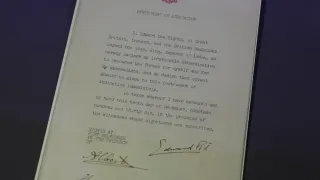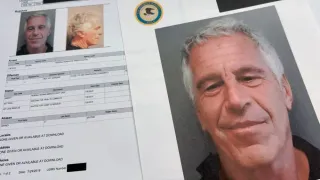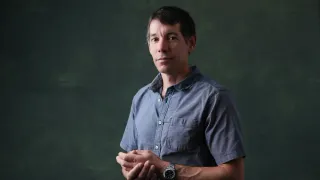May 4, 2024
Terrorism and Sex: Israeli Director Nitzan Gilady Discusses his Thriller 'In Bed'
Kilian Melloy READ TIME: 10 MIN.
There's a lot of sex in Nitzan Gilady's erotic, psychological thriller "In Bed," and a lot of male nudity. There's even more suspense, since the film is set against a terrorist act targeting celebrants at a Pride parade in Tel Aviv.
"In Bed" is available on major streaming platforms. follow this link for more information.
In the film, Guy (Israel Ogalbo) and Joy (Moran Rosenblatt) guzzle some ecstasy and head out to partake in the revelry. Things are going fine when gunfire suddenly rings out, sending everybody scattering. Guy catches a glimpse of the killer... or is it a product of his imagination?
Hurrying back home, Guy encounters a terrified Russian immigrant named Dan (Dean Miroshnikov) and, despite the horror of the situation, finds himself attracted. They don't hook up right away – Joy spends hours at Guy's flat, the two of them staring at the television in terror and anguish, and two attempts at Grindr dates go nowhere. Finally, Guy reconnects with Dan on the app, and invites him over. Outside Guy's flat, the city throbs with rage and fear; the perpetrator is still at large; rumors fly that the killer is gay himself; and gangs of extremists attack lone queer men. But inside Guy's flat, all is lust, drugs... and a growing sense of apprehension, as Guy begins to suspect that the killer he thought he saw might in fact be the man in his bed.
"I think that the sex was very easy," Gilady tells EDGE about working on the shoot with his two hunky leads. "But Guy's anxiety and fear, which very much relates to his psychological issues, was much more difficult." Along with that, there was challenge of creating a sense of ever-increasing, drug-fueled paranoia within the confines of Guy's flat, where most of the film is set.
With his background in theater and documentary filmmaking, Gilady creates a sense of realism that can seem almost overwhelming; at the same time, the actors under his direction veer from lust to fear to out-of-body ecstasy with every new wrinkle in the plot and each pill and puff in which they indulge. Reality seems to erode as substances are ingested, and the hate crime precipitates years of parental rejection and internalized homophobia for both Guy and Dan.
But all is not angst: The film offers many moments of tenderness between the men, as well as between Guy and Joy, who are best friends (though Joy obviously wishes they could be more).
"In Bed" is Gilady's second feature. His first, "Wedding Doll," also starred Rosenblatt, whose work in the film won her the prestigious Ophir Award (Israel's equivalent, a proud Gilady tells EDGE, of an Oscar). It doesn't feel like a second feature; Gilady shows off a mastery of camera technique, atmosphere, pacing, and place. The director told EDGE about the film's challenges and intentions.
EDGE: You've made an interesting choice to set this drama against the backdrop of a mass shooting at a Pride celebration.
Nitzan Gilady: [There was a] hate crime that happened in Tel Aviv [in 2009], when a man wearing black went into a youth LGBT center and shot [up] the place. He killed two people and [left] a lot of the young kids wounded. The police couldn't find him, and he's still walking freely.
There were a lot of rumors that he [might be] someone from the community... that it was someone who was involved with one of the instructors in this youth center. It really affected me – especially with the fact that when you're using Grindr, sometimes you let someone into your home and you don't even know his name. I started to be a bit paranoid about the fact that maybe I'm opening a door to a killer. Who am I letting slip with me in the bed?
EDGE: You're right that there's a bit of danger when people go on hookup apps. Is that part of the thrill?
Nitzan Gilady: Yeah. I mean, I'm not saying stop [using the apps], but I think that you have to be aware of [the risks]. I think it's parallel to [something else] I'm dealing with the film: The excessive use of drugs. A lot of the sex dates [involve] chemsex, especially now – it's more [prevalent] now with the young people. It's almost like taking a line of coke is like drinking beer, you know?
I'm not preaching; everybody should do what they want. But you need to be aware of what zone you're crossing into. A lot of people are taking it too far, losing their jobs, finding themselves isolated from their families and friends. [It's] a part of our culture, unfortunately, and a part that we need to talk about in order to be able to protect ourselves. That's also part of why I wanted to make this film.
EDGE: The film's mix of paranoia and lust calls for a particular chemistry between the leads.
Nitzan Gilady: It was very difficult to find the right actors. I searched for [an actor to play] Guy for almost a year, and whoever I met, they were always acting the part instead of being the part. I was looking for somebody who's gonna be the character – they're gonna be able to live the moment in front of the camera. I don't know if you know about "The Big Brother?" It's a reality TV show.
EDGE: Of course.
Nitzan Gilady: [Israel Ogalbo] was the winner of "The Big Brother." I was really surprised at his quality and his energy. But when I approached him, I realized that he's not an actor. He had that the energy, but he wasn't able to grasp who Guy is at the beginning, and it was a very interesting process to go through.
And for Dan, Dean was the only guy who I saw [for the part].
EDGE: There's a suggestion that Dan is part of a Russian criminal element.
Nitzan Gilady: Dean's Ukrainian, actually, but he was playing a Russian guy. I'm sure that you're aware of what's going on in Russia in terms of the LGBT community and LGBT rights. There are so many countries [where] LGBT people still are not accepted; look also what's going on in America. We're going backwards with the LGBT rights. It's a pretty scary time. And it's weird, because when I wrote it – five, six years ago – I thought that things will change [for the better], but it looks like the world is going in a negative direction.
EDGE: There's definitely something shady about Dean, but still, we see many moments when he's very tender and affectionate with Guy, and that seems genuine.
Nitzan Gilady: Absolutely, because I think that when he's with Guy, he could definitely [show that] tenderness. He wants love, he wants to be accepted. He wants to have that romance. He would have stayed with [Guy] if he wouldn't have all the demons in him. But he's [the product] of his environment, the education that he received, his abusive father.
Up until the age of 35 I was in the closet, and I literally felt that the self-hate burned my mind and my organs. I had a lot of problems with my stomach, and I wasn't able to be myself. I didn't do anything violent or aggressive, but I was violent to myself in some ways.
EDGE: What has the response to the film been like?
Nitzan Gilady: We got a huge [response] from the gay community. We had screenings with doctors who deal with drug abuse, and then some of the audience members actually stood up in the Q&A and talked about how accurate the film is. They were very generous and talked about their addiction to drugs.
But some of the people from the LGBT community were not happy to see a film like this. You could see the anger – like, "Oh, no, I don't want to see that. That doesn't represent me." And I said, "What do you mean it doesn't represent you? It doesn't mean that it's you, and it's part not just of the LGBTQ community, it's part of the whole society."
EDGE: You're already making your next film. Can you say something about that?
Nitzan Gilady: It's a film that deals with an Ultra-orthodox Jewish couple, [and] with the treatment of LGBT [people] in the Ultra-orthodox world. Do you know what I mean when I say treatment? I forgot what's the name for it.
EDGE: You mean so-called "conversion therapy?"
Nitzan Gilady: "Conversion therapy," yes.
EDGE: Well, that's fun.
[Laughter]
Nitzan Gilady: You know, I want to make fun films, too, but before those two fiction films I was making documentaries. When you come from that world, you want to talk about important subjects. I want to use cinema to be able to talk to people about subjects that need to be talked about.
Watch the trailer to "In Bed."
"In Bed" is available on major streaming platforms. follow this link for more information.






